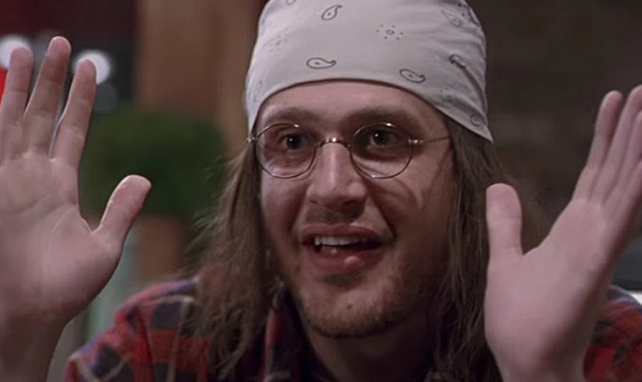“Technology is only going to get better. And it’s going to become more and more comfortable for people to sit in a room alone enjoying things made by people who don’t love them but want their money.” So goes one of the many salient and prophetic aphorisms laid out by David Foster Wallace (Jason Segel) in James Ponsoldt’s The End of the Tour.

After writer/aspiring writer (what is meant by this is that he has not achieved the national fame and acclaim of Wallace) David Lipsky (Jesse Eisenberg) implores his editor at Rolling Stone (played by Ron Livingston, in a typically apathetic role) to let him accompany David Foster Wallace on the final leg of his book tour for Infinite Jest to Minneapolis, Lipsky is forced into recognizing not only the depressive psychosis of Wallace, but also his own neurotic foibles via the interview that results from their five days spent together.
Although Lipsky has published a book of his own, called The Art Fair, his lack of behemothic success as compared with Wallace’s makes him hesitate about mentioning this fact to the literary titan–although he does, of course, mention that he’s a fiction writer as well. Fortunately, Lipsky is adept at keeping the focus off of himself as a born journalist determined to get to the heart of what makes his subject tick. In Wallace’s case, it seems to be diet soda, his two dogs and Alanis Morissette (it’s 1996, mind you).

Possessing a simultaneous openness paired with a desire to come across as likable and “regular,” Wallace endears Lipsky, who relates to his insecurities about himself and his writing. The milieu of prime Americana that the two find themselves in (specifically, the Mall of America) is part and parcel of the irony that Wallace is able to touch on consistently–knowing full well that “Americanness” is part of why he’s so unhappy. While embracing what he calls his “regular guyness,” he knows that he possesses knowledge far beyond the average denizen of the country. He sums it up succinctly to Lipsky by saying, “You think you’re better than everyone because you know it’s all a delusion and you know you’re worse because you can’t even fucking function.”

This sort of dichotomous sentiment and state of being that possesses Wallace is what made him so fascinating and so brilliant–and what continues to captivate his fans all these years later. As for Segel, it must be said that one forgets at times that this is not the man who played stoner Nick on Freaks and Geeks (until Becky Ann Baker, who played Lindsay Weir’s mom on the show, appears to introduce him at the Minneapolis bookstore Wallace reads at, in a sort of meta reference Wallace would have appreciated). Though there are moments when he faintly resembles George Bluth Sr. from Arrested Development, Segel seems to have done his fair share of research in taking on such a distinct persona. Eisenberg, too, may have done the same, but his nervous tittering throughout gets to be a bit played after awhile. Undoubtedly, Eisenberg, who fancies himself a writer like James Franco, became erect a few times over the role he was playing. And yet, it’s like Wallace said, he hates people who go around declaring, “I’m a writer, I’m a writer, I’m a writer” when all they really want is the fame part of it. There truly is nothing worse. And even he was reluctant to classify himself as such, but The End of the Tour showcases a man so racked with paradoxes and melancholy that it’s impossible not to see him as anything other than a born author.




















